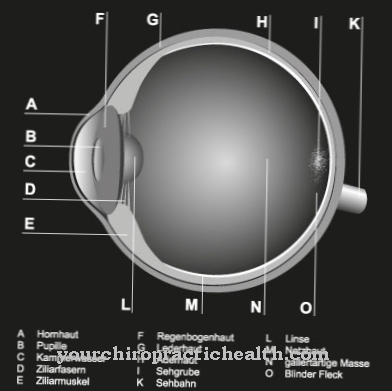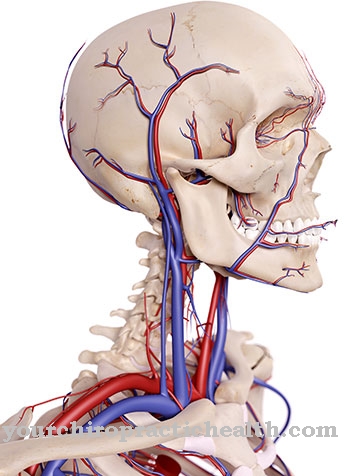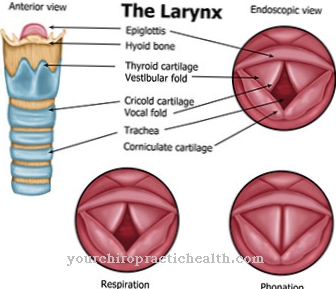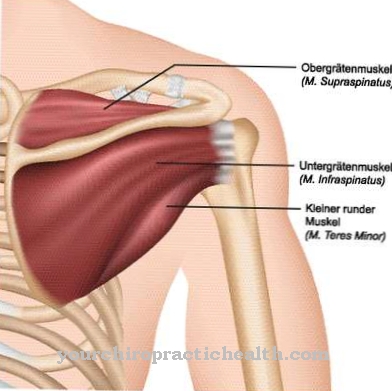A Cardiac neurosis or Heart phobia is a fairly common occurrence. Those affected suffer from heart problems, but these are not due to an organic disease of the heart.
What is a heart neurosis?
.jpg)
© paul - stock.adobe.com
Cardiac neuroses usually have psychosomatic causes and occur over a longer period of time. Statistics show that in about every third patient with heart problems no organic causes are found and the symptoms can be traced back to a heart neurosis.
At a Heart phobia sufferers often complain of heart problems over a long period of time. A heart neurosis goes hand in hand with a great fear of those affected by a serious heart disease, up to and including a heart attack. However, no sufficient organic causes can be found for the symptoms that occur.
A heart neurosis is thus a psychosomatic disorder, which is more precisely defined as a somatoform autonomic dysfunction. Heart neuroses are very common. About a third of patients with heart problems cannot be traced back to physical causes and therefore fall into the category of heart neuroses.
Heart neurosis primarily affects men between the ages of 40 and 60.
causes
A Cardiac neurosis (heart phobia) usually cannot be traced back to organic causes. As a rule, the heart complaints are caused by unconscious fears of the patient. A heart neurosis is usually a psychological defense mechanism. The actual fears are transferred to another target, the heart.
This distracts the person concerned from their actual fears. Stressful and anxiety-inducing events can be the loss of a loved one or the fear of losing one's job. Often in the social environment of patients with a heart neurosis there are people with a heart disease, so that the person affected unconsciously projects their fears onto the heart.
In some cases, a heart neurosis can also develop if an actually harmless diagnosis is misunderstood and classified as serious and serious by the person concerned. Other mental illnesses, such as anxiety disorders or depression, can also trigger a heart neurosis.
Symptoms, ailments & signs
The main symptom of a heart neurosis is a constant fear of a heart attack. This fear can manifest itself in panic attacks or even deathly fear. During the panic attacks, the heart rate increases and blood pressure increases. Most of the time, symptoms such as palpitations, palpitations and pain in the heart region also occur during panic attacks.
Sweating, shortness of breath, tremors and dizziness are also common. Often the symptoms alternate. In addition, those affected often suffer from nervous gastrointestinal complaints and sleep disorders. As a rule, no organic causes are found in examinations, but the quality of life is severely limited by fear.
Those affected live under constant tension internally because they constantly fear that they have a heart problem and something bad will happen to them. To prevent this, put yourself in a relieving position and constantly watch yourself, which makes the problem even worse because it is a psychological problem. Because they often feel misunderstood by those around them, those affected often withdraw and develop the conviction that no one can help them. The social withdrawal is and the resulting loneliness increases the excessive introspection and anxiety again.
Diagnosis & course
To a Cardiac neurosis to diagnose with certainty, all possible organic causes must be ruled out. In addition to a general physical examination, cardiological examinations are also necessary. This includes EKG and stress EKG, as well as an echocardiography (ultrasound examination of the heart).
In addition, the blood pressure is measured and a blood test is carried out. An X-ray examination is also often carried out. Heart neurosis is often only diagnosed after numerous visits to the doctor. If the heart neurosis is diagnosed and treated early, the patient's condition usually improves after one to two years. If there are other mental illnesses, the duration of treatment can be significantly extended. An untreated heart neurosis can become chronic.
Complications
The heart neurosis can lead to both psychological and physical complaints, which can limit the patient's everyday life and quality of life. In most cases, severe anxiety and panic attacks develop. Those affected also suffer from depression and other moods and therefore no longer actively participate in life.
The patient's resilience also decreases enormously and pain in the heart and chest occurs. It is not uncommon for the pain to be accompanied by difficulty breathing and hyperventilation. Those affected feel an oppressive feeling in the chest and are scared to death. It is not uncommon for those affected to lose consciousness due to the heart neurosis and can thus injure themselves if they fall.
In the worst case, the disease can lead to patient death if it is treated too late or not at all. There are no further complications with the treatment itself. However, these can prove severe if they are primarily psychological in nature. If the treatment is successful, the life expectancy of the patient is not influenced by the cardiac neurosis.
When should you go to the doctor?
If symptoms such as chest and heart pain, shortness of breath, and oppression are noticed, then in some cases a pronounced heart neurosis is present. A visit to the doctor is indicated if the symptoms appear suddenly and do not go away on their own. Even slowly increasing symptoms should be clarified by a doctor. If there is hyperventilation, heart pain, or breast stinging, the patient should see a doctor immediately. The same applies to dizziness and panic attacks.
People who suffer from depression or anxiety disorders are particularly prone to developing cardiac neurosis. Likewise, mentally stressed people who have heart patients in their circle of friends, because with these groups of people there is an increased risk that the fears are unconsciously projected onto the heart. In the best case, the underlying mental illness is treated before a heart neurosis develops. If symptoms have already set in, the family doctor must be consulted. This can establish contact with a psychologist and also refer the person concerned to a cardiologist. The doctor or therapist must be informed immediately about new symptoms and complaints.
Doctors & therapists in your area
Treatment & Therapy
When treating a Cardiac neurosis what is most important is a careful and sensitive approach by the doctor. It must be made clear to the patient that there are no organic causes and that the symptoms are harmless. At the same time, the patient must get the feeling that he is being taken seriously. Under no circumstances should it be conveyed that the complaints can be traced back to imagination or fantasy.
In fact, this is not the case, as symptoms such as palpitations are actually present. A heart neurosis can be treated with psychotherapy. In many cases, drugs are also used. Beta blockers, antidepressants or benzodiapines can be prescribed. Beta blockers can be used to treat symptoms such as palpitations, even if the heart problems cannot be traced back to a direct heart disease.
Antidepressants and benzodiapines are used when there are additional mental illnesses such as anxiety disorders or depression. Autogenic training and exercise can also be helpful. These measures are particularly recommended if those affected have developed avoidance behavior. In this way they learn that moderate exercise and stress on their own body is not harmful or dangerous in a cardiac neurosis.
Outlook & forecast
The prognosis for a heart neurosis is only positive if the person concerned recognizes it as a psychological problem. Therefore, the terms heart phobia and heart neurosis already include the psychological aspect.
The problem, however, is that the symptoms of cardiac neurosis appear to be clinical and physical.In certain situations heart palpitations, heart stumbling, sweating, panic attacks and similar symptoms occur. These can be very scary. They often lead those affected from one doctor to another. Often times, the symptoms of the heart can be confirmed, but a cause cannot be found.
Since those affected usually only describe physical complaints, the heart neurosis is often not immediately recognized as an anxiety disorder. First of all, all differential diagnostic means are exhausted in medical operations. After all, there could also be an organic cause.
The heart neurosis belongs to the panic diseases. It can be misjudged for a very long time because of its frightening symptoms. In addition, there are often long waiting times for psychotherapeutic care. The earlier therapy begins, the better the chances of recovery. Without long-term treatment, cardiac neurosis usually cannot be managed successfully.
It is important that the person concerned can develop confidence in their body again. The prognosis is worse if the patient has a fearful attitude or is to be classified as suicidal because of the heart phobia.
prevention
One Cardiac neurosis cannot be prevented. An improvement of the symptoms can be achieved more quickly if the possibility of psychosomatic causes is considered as early as possible after the onset of the first heart complaint. Those affected should also trust the diagnosis of the treating doctor and be aware that the symptoms are actually harmless and have no organic causes. In this way, the symptoms of the heart neurosis can be treated faster and more successfully.
Aftercare
In most cases, the person affected has very few options or measures for follow-up care. With this disease, the person concerned must first and foremost see a doctor as soon as possible so that there are no further complications or complaints. The earlier a doctor is contacted, the better the further course of this disease will usually be.
An early diagnosis is therefore highly recommended and the person affected should consult a doctor at the first symptoms or signs of the disease. In most cases, heart neurosis is treated by taking various medications. The person affected should always ensure that they are taken regularly and that the dosage is correct.
In the event of interactions or side effects, a doctor should always be consulted first so that there are no further complications. Psychological treatment should also be carried out for cardiac neurosis. The help and support of your own family is also very important and necessary to prevent further depression or other psychological upsets. In most cases, the cardiac neurosis does not reduce the life expectancy of the person affected.
You can do that yourself
With a heart neurosis, you lose confidence in your own physical performance. Exertion is avoided in order to protect the heart, which affects stamina and muscle strength.
Regular exercise and light sporting activities help to break this vicious circle: walks are a good idea to start with, while endurance sports such as cycling, jogging or swimming have a positive effect on the cardiovascular system as self-confidence increases. The training should be started very carefully and only increased slowly. A trusted training partner provides security in the event that heart problems occur during the activity.
Heart phobia is often associated with constant psychological tension, which manifests itself on a physical level as muscle tension. This in turn can cause sharp pain in the chest. Various relaxation techniques help to loosen up the muscles and restore mental equilibrium. With a heart neurosis, yoga, special breathing exercises and progressive muscle relaxation are particularly effective. If the heart phobia is overburdened or unresolved problems are hidden, learning stress management techniques can help to better cope with the challenges of everyday life.
If self-treatment does not lead to any improvement, the help of a behavior therapist should be sought. This can also help if, against better knowledge, it is not possible to perceive occasional changes in the heartbeat as normal and harmless.













.jpg)

.jpg)
.jpg)











.jpg)